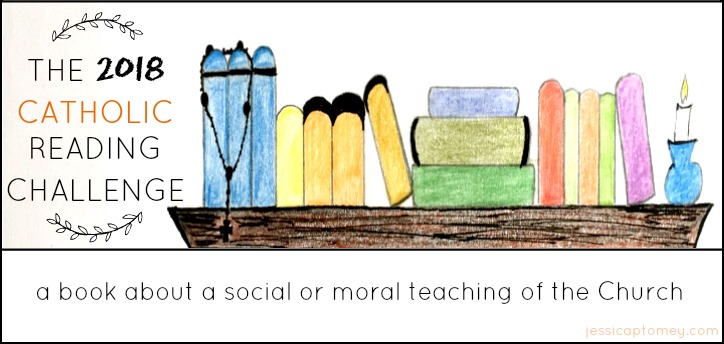It honestly kind of feels like we just started the 2018 Catholic Reading Challenge. Is it just me?? How is it the middle of November?! I am continuing to share what I am reading for the challenge. I’m a little behind schedule on reporting back to you…so onward to the next pick…

Category: “a book about a social or moral teaching of the Church”
My Pick: Love and Responsibility by Karol Wojtyla (St. John Paul II)
One of my reading strategies for this year’s challenge has been to “shop from my shelves.” There are numerous books on my physical and digital walls that have yet to be cracked; so it has been a fun added challenge to find unread books that fit this year’s categories.
My husband was reading Love and Responsibility earlier this year for a class in his Philosophy M.A. program, and our conversations pulled me in. I will go ahead and say that this book falls into “heavier” reading, at least I think the average person would say so. It’s more of an in-depth look a the framework for the Church’s teaching on sexual ethics, rather than a summary/easy-read text. I don’t say that to dissuade you from reading it — because it is profound — I just want you to know what you are getting into. It’s well worth your time.
Originally published in Polish in 1960, St. John Paul II wrote this back before his papacy, as Karol Wojtyla. There is a lot here, and I’m not going to summarize it all. I will just focus on what is most primary and why you should read it. He’s unpacking the philosophical and theological foundation for the Catholic understanding of sexual love’s role, which is very much contrary to mainstream society’s view of sexuality.
The whole book hinges on JPII’s concept of the personalistic norm, which holds that “the person is a good towards which the only proper and adequate attitude is love” (p. 41). This view stands in contrast to the “utilitarian” value system, dictating prominent cultural views today on sexual ethics, which holds that the purpose of sex (with another person — the object) is the pleasure of the individual (the subject). He demonstrates how the end of the personalistic view results in love of a person as a person, while the utilitarian view results in the objectification of a person for pleasure, which is contrary to love altogether.
All understandings of how we interact with sexuality, the sexual urge, chastity, marital love, etc. have their root in this view of the other as a person. Therefore, closely connected with the concept and action of love is the concept of responsibility — to love someone, in any relationship, but particularly in the sexual and marital act of love is to be responsible for that person. I love how he puts it:
“Love divorced from a feeling of responsibility for the person is a negation of itself, is always and necessarily egoism. The greater the feeling of responsibility for the person the more true love there is.” (p. 131)
This book did two things for me. First, it helped elucidate the philosophical underpinnings for the Church’s teaching on sex (why it’s only moral and an expression of love in the context of marriage between a man and woman). His arguments make a lot of sense, and connect theology of the body to what we know in other fields like psychology and philosophy. Second, it challenged me in my overall attitude in my own marriage. I felt the weight of responsibility that I carry in how I love my spouse. The sexual expression of love in a marriage is significant, and a couple’s attitudes toward that act matter greatly. I closed the book with a sense of reverence for the subject matter and how it applies in my own day-to-day loving of my husband, the person who in this journey heavenward is both my partner and my path.
What did you read for “a book about a social or moral teaching of the Church”?

Copyright 2018 Jessica Ptomey
